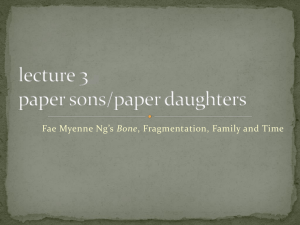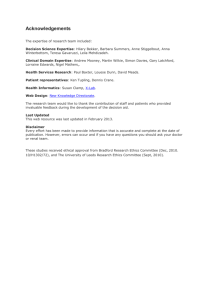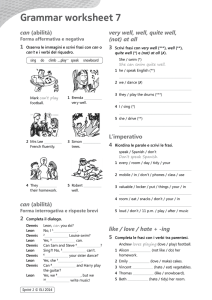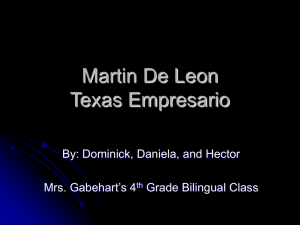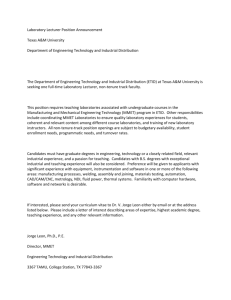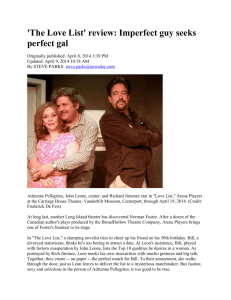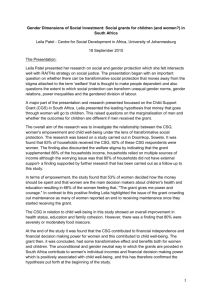Family and Identity in the novel Bone
advertisement
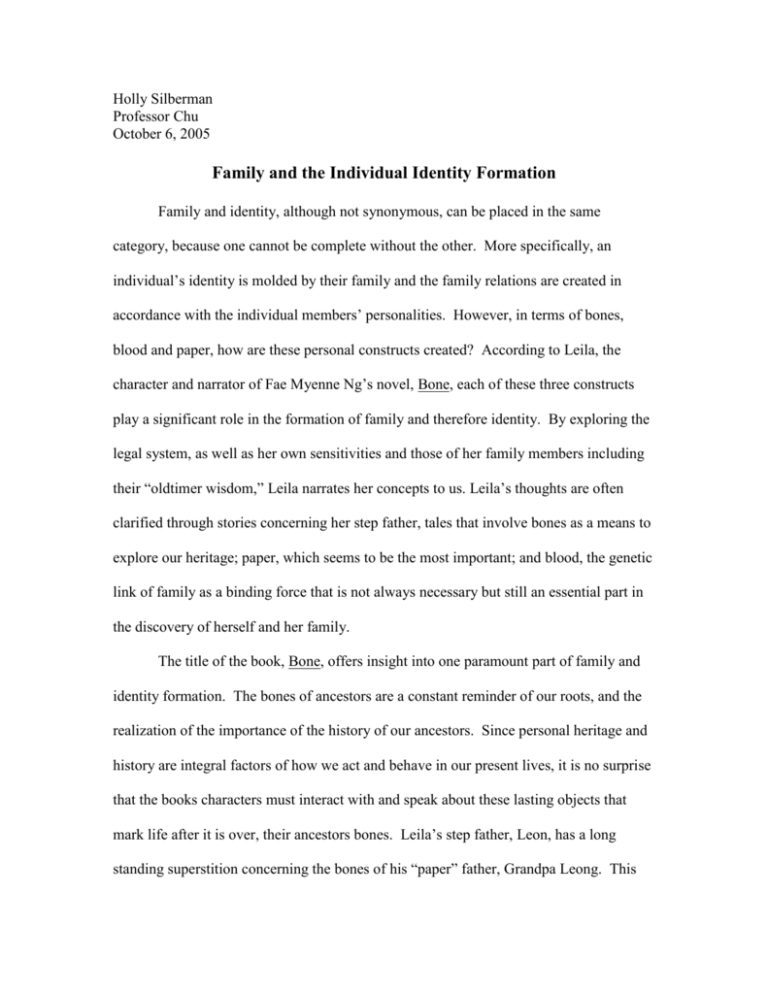
Holly Silberman Professor Chu October 6, 2005 Family and the Individual Identity Formation Family and identity, although not synonymous, can be placed in the same category, because one cannot be complete without the other. More specifically, an individual’s identity is molded by their family and the family relations are created in accordance with the individual members’ personalities. However, in terms of bones, blood and paper, how are these personal constructs created? According to Leila, the character and narrator of Fae Myenne Ng’s novel, Bone, each of these three constructs play a significant role in the formation of family and therefore identity. By exploring the legal system, as well as her own sensitivities and those of her family members including their “oldtimer wisdom,” Leila narrates her concepts to us. Leila’s thoughts are often clarified through stories concerning her step father, tales that involve bones as a means to explore our heritage; paper, which seems to be the most important; and blood, the genetic link of family as a binding force that is not always necessary but still an essential part in the discovery of herself and her family. The title of the book, Bone, offers insight into one paramount part of family and identity formation. The bones of ancestors are a constant reminder of our roots, and the realization of the importance of the history of our ancestors. Since personal heritage and history are integral factors of how we act and behave in our present lives, it is no surprise that the books characters must interact with and speak about these lasting objects that mark life after it is over, their ancestors bones. Leila’s step father, Leon, has a long standing superstition concerning the bones of his “paper” father, Grandpa Leong. This uneasiness stems from a failed promise to return Grandpa Leong’s bones to China for burial, creating an excuse for all of Leon’s failures. “Of more consequence was the promise to send Grandpa Leong’s bones back to China…Leon worried about the restless bones, and for years, whenever something went wrong—losing a job, losing the bid for the takeout joint, losing the Ong and Leong Laundry—Leon blamed the bones” (Ng 50). In Leon’s mind and in the eyes of his stepdaughter, Leila, his identity and position in society are both based on the bones of Grandpa Leong and their implications of family responsibility deserving of punishment if not carried out. However, the bones do not serve only as a reminder of Leon’s failures to follow through on a promise, they can also be seen as a gateway into his past which helped to shape who he is today. Because the bones belong to Grandpa Leong who granted Leon access into the country, they allow the reader to travel back with Leon and explore the time of his arrival to America and his troubles with paper credentials. Paper, therefore, becomes another entity in the formation of family and personal identity. In regards to Leon, his entire identity in America is based on the information sold to him for access into the country and the ensuing forms and documents that he saved. Due to the strict laws against Chinese emigration, it was necessary for Leon to have documents detailing him as a returning citizen to America which he purchased from Grandpa Leong. At some point in time, Leon begins to lose a sense of who he is compared to the paper trail that he has gathered, “Leon was always getting his real and paper birthdates mixed up; he’s never given the same birthdate twice. Oldtimer logic: If you don’t tell the truth you’ll never get caught in a lie” (Ng 55). Since Leon seems to have confused an exact idea of his history, he must depend on paper documents to re- establish himself in a legal sense. This troubles him greatly when he goes to collect social security and must prove his identity through a certified document. In this way, paper is the only plausible way for Leon to reassert his identity, even if the documents are fake, they are the only things Leon has to go by. Leila, who accompanies him to the government office, must help Leon recover his past, or at least a manuscript that will manufacture a paper past and allow him access to the social security funds. Leila, in search of certain credentials that can help Leon in his social security case, delights in finding that he has millions of papers saved of his true life that can give her insight into his past. Reading these papers, for Leila, is a means of defining who her stepfather is, as she equates what is written to who he is today, “Maybe Leon should have destroyed these papers. They held a truth about Leon I wasn’t sure I wanted to know” (Ng 58). It is as if Leila figures that what she has seen written regarding Leon must be the truth about who her step father is, and she does not like what she sees. Leila is asserting that to her paper is law and that what is written constitutes a person’s identity. In fact it appears that she has obtained this notion from Leon himself, “And this paper son saved every single scrap of paper. I remember his telling me about a tradition of honoring paper, how the oldtimers believed all writing was sacred” (Ng 58). Therefore Leon’s identity in Leila’s eyes is formed by a specific paper construct that her family had created, one that was perpetuated by Leila’s relations with her real father. When Leila’s biological father abandoned her and her mother, her only communication with him was through a letter correspondence. In this regard, her concept of her true family and heritage is necessarily centered on the use of paper. “I’ve never seen him…I’ve seen his picture and read his letters. I know him by the name he used in his letters. ‘Your father, Fu Lyman’” (Ng 187). She therefore equated the concept of family with paper because for so many years, before the arrival of her step father, her only means of communicating with the dominant male figure in her life was through writing. Even the name of her biological father, which she had kept for so many years, haunted her and only through the use of a legal document, in this case a marriage certificate, was she able to let go of his name, “For me, the one good thing about getting married was that I was finally rid of my real father’s name, Fu” (Ng 18). Leila finds a legal document as the only way to move on from her abandonment by her father that has shaped her identity and consequently her actions and decisions of today, especially concerning the men in her life. However, Fu Lyman was still, by blood, her father and therefore she felt a strong connection with him, yet Leon’s integration into her life, despite the lacking of biological ties allows more insight into what she feels constitutes a family. Some people may assume that the most binding aspect of relations is the fact that they are connected by blood. However, when Leila speaks of her step father, she obviously feels he is part of her family and that sharing of blood is necessary when defining family, “He’s not my real father, but he’s the one who’s been there for me. Like he always told me, it’s time that makes a family, not just blood” (Ng 3). Leila has spent the majority of her life with Leon as the only “real life” masculine paternal figure; therefore, she considers him to be a surrogate father bypassing the need of family to be genetically related. This does not necessarily seem to be the same feelings of the other members of Chinatown. When Leila’s mother, Mah, becomes upset at the death of Grandpa Leong, or Leon’s “paper father” the fellow workers at her sewing shop comfort her by saying, “’Loosen your heart from the matter. He’s not your father, he’s not a blood relation. You’re just doing what a good person should’” (Ng 81). Even though her coworkers urge her to not take it personally, as only real family matters, it is obvious that Mah values Grandpa Leong despite his lack of actual blood relation. The absence of actual genetic connections, in this case, is an important example of the forming of families beyond the traditional concepts of family as blood only. It is clear that the true Leong family has been formed without blood, but is instead based on other, less tangible ideals such as trust, and compassion forged over time. “Blood and Bones. The oldtimers believed that the blood came from the mother and the bones from the father” (Ng 104). Fae Myenne Ng includes this anecdote in her novel, yet the narrator, Leila does not see herself and family in this manner. Although she can learn much about her heritage through these two pathways, and does ascribe them a vast importance, it seems as though paper is the most concrete way for Leila to establish identity in herself and others. Perhaps it is because of the legality that is associated with certain documents, or the seeming finality of the written word, whatever the case is, there is definite emphasis placed on manuscripts. Leila, however, does not place total importance on the idea of paper. Bones do allow Leila to resurrect the past and discover how that fits into her present life, and blood in a contradictory manner allows Leila to realize what it means to truly be family. Besides the concepts of paper, blood and bone, Leila is also willing to go beyond the elucidated constructs, and place emphasis on her own emotions for defining family and herself. She considers feelings of love built over time towards family members, genetically linked or not, instrumental in binding her to them and a way of creating herself. Leila and the reader come to realize the many constructs and nuances essential to appreciate the forming of family ties, heritage and self identity.
